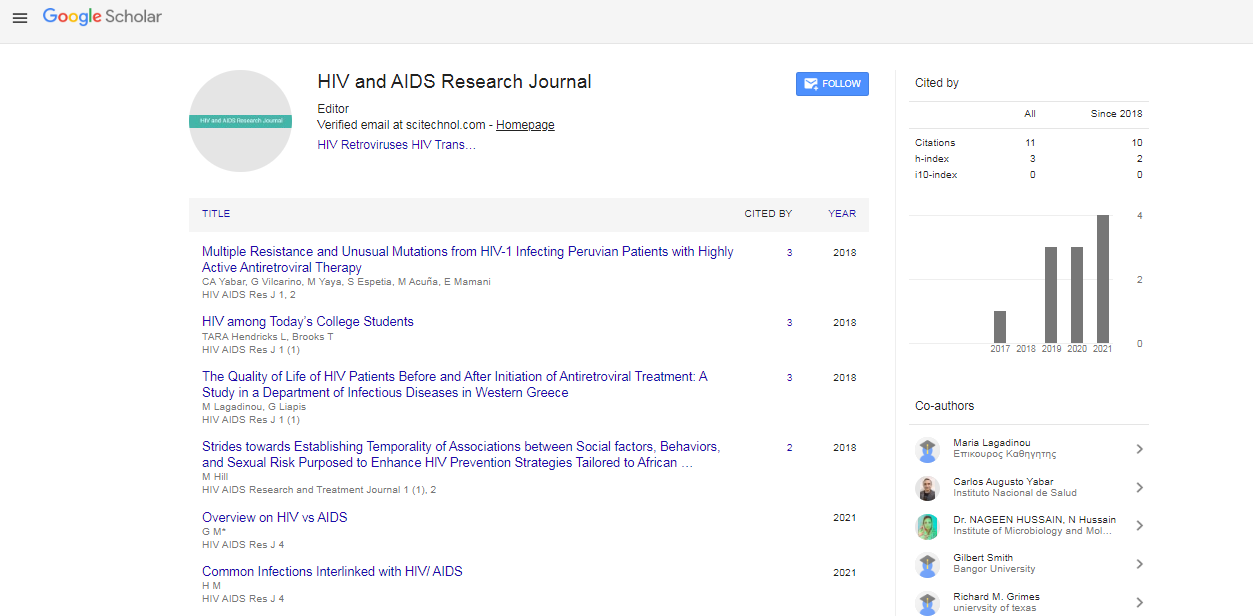Opinion Article, Hiv Aids Res J Vol: 6 Issue: 1
The Impact of HIV on the Immune System
Yurou Xia*
Department of Biochemistry and Molecular Biology, Jiangsu University, Jiangsu China
*Corresponding Author: Yurou Xia
Department of Biochemistry and Molecular Biology,
Jiangsu University, Jiangsu China
E-mail: yurouxia@bmb41.cn
Received date: 20 February, 2023, Manuscript No. HARJ-23-93539;
Editor assigned date: 22 February, 2023, PreQC No. HARJ-23-93539 (PQ);
Reviewed date: 09 March, 2023, QC No. HARJ-23-93539;
Revised date: 16 March, 2023, Manuscript No. HARJ-23-93539(R);
Published date: 23 March, 2023, DOI: 10.4172/Harj.1000117
Citation: Xia Y (2023) The Impact of HIV on the Immune System. HIV AIDS Res J 6:1.
Description
Human Immunodeficiency Virus (HIV) is a virus that attacks the immune system, specifically the CD4 cells, which are crucial in fighting infections. HIV weakens the immune system, making it susceptible to other infections and diseases. The immune system is a complex network of cells, tissues, and organs that work together to protect the body from harmful pathogens. HIV attacks the immune system by destroying CD4 cells, which are responsible for coordinating the body's response to infections. The immune system has various defense mechanisms that work together to protect the body. The immune response can be divided into two categories. Innate immunity and Adaptive immunity. Innate immunity is the first line of defense against pathogens and provides a rapid response to infections. It involves physical barriers, such as the skin and mucous membranes, which prevent pathogens from entering the body. It also involves the activation of immune cells, such as neutrophils and macrophages, which engulf and destroy pathogens. Adaptive immunity, on the other hand, is a specific response to a particular pathogen. It takes longer to develop but provides long-lasting protection against future infections. Adaptive immunity involves the activation of B cells and T cells, which are specialized immune cells that recognize and destroy specific pathogens. Antibodies are proteins that are produced by B cells and neutralize harmful pathogens. CD4+ T cells plays a essential role in the immune system, acting as the central coordinators of the immune response. HIV targets these cells by attaching to the CD4 receptor on their surface and entering them. HIV replicates inside the CD4+ T cells, leading to their eventual destruction. As CD4+ T cell numbers decline, the body's ability to fight infections and cancers weakens, leading to the development of AIDS. Additionally, the loss of CD4+ T cells also results in the reduced production of cytokines, which are key signaling molecules that regulate the immune response. HIV also attacks other cells in the immune system, such as macrophages and dendritic cells, which are responsible for detecting and destroying pathogens. The immune system responds to HIV infection by producing antibodies and activating T cells. However, HIV has the ability to mutate rapidly, which makes it difficult for the immune system to keep up. As a result, HIV can evade the immune system and continue to replicate and destroy CD4 cells. HIV's impact on the immune system also extends to the overall immune response. As the virus replicates and destroys immune system components, the body's ability to mount an effective immune response against other pathogens decreases. HIV also impairs the production of antibodies, which are crucial in neutralizing viruses and bacteria. As a result, people living with HIV are at a higher risk of developing infections, cancers, and other diseases.
Conclusion
The effect of HIV on the immune system is a complex process that involves interactions between the virus and various immune system components. HIV primarily targets CD4+ T cells, leading to their eventual destruction and dysfunction of other immune system components such as macrophages and dendritic cells. The loss of CD4+ T cells, reduced cytokine production, and impaired immune response increase the risk of developing infections, cancers, and other diseases. Understanding the impact of HIV on the immune system is crucial in developing effective treatments and vaccines to combat HIV/AIDS.
 Spanish
Spanish  Chinese
Chinese  Russian
Russian  German
German  French
French  Japanese
Japanese  Portuguese
Portuguese  Hindi
Hindi 